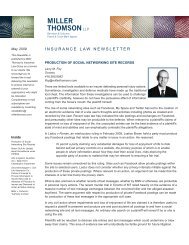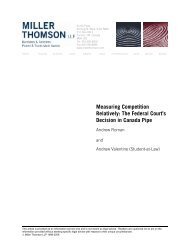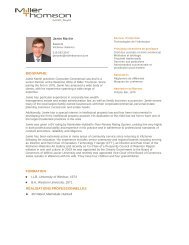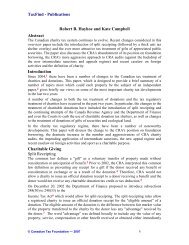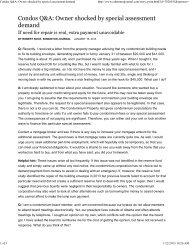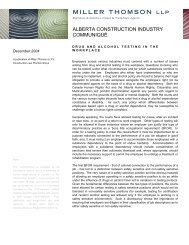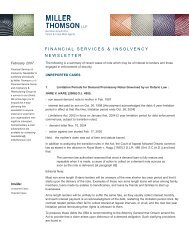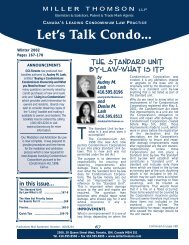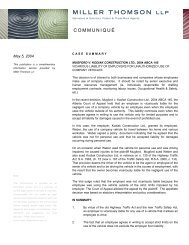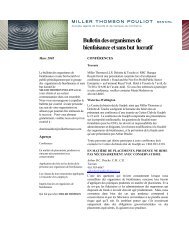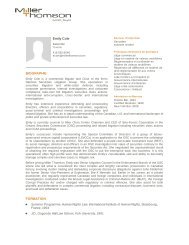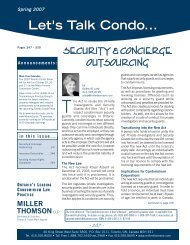"Consent and the Personal Health information ... - Miller Thomson
"Consent and the Personal Health information ... - Miller Thomson
"Consent and the Personal Health information ... - Miller Thomson
You also want an ePaper? Increase the reach of your titles
YUMPU automatically turns print PDFs into web optimized ePapers that Google loves.
–8 –<br />
HICs who are entitled to rely upon an assumption of implied consent in <strong>the</strong>se circumstances are<br />
generally those health providers who are directly involved in <strong>the</strong> provision of care. 40 They do<br />
not include, for example, <strong>the</strong> Ontario Ministry of <strong>Health</strong> <strong>and</strong> Long Term Care or Medical Officer<br />
of <strong>Health</strong>. Notwithst<strong>and</strong>ing that <strong>the</strong>se latter categories of HICs cannot assume implied consent;<br />
<strong>the</strong>y may still rely upon implied consent in appropriate circumstances, where it is reasonable to<br />
do so. 41<br />
Those HICs who are entitled to assume <strong>the</strong> individual’s implied consent for <strong>the</strong> collection, use<br />
<strong>and</strong> disclosure of PHI for health care purposes are sometimes referred to as <strong>the</strong> “circle of care”.<br />
This is not a defined term under PHIPA, <strong>and</strong> as such, it can be used differently by different<br />
individuals <strong>and</strong> organizations. The Hospital Privacy Toolkit describes it as follows:<br />
The term “circle of care”describes those “…individuals <strong>and</strong> entities such as health<br />
professionals, laboratories, hospitals, pharmacies”etc. “…who provide health care or<br />
assist in providing health care to a particular patient. Members of a particular patient’s<br />
“circle of care”can provide health care to <strong>the</strong> patient, confidently assuming that <strong>the</strong>y<br />
have consent to collect, use <strong>and</strong> disclose <strong>the</strong> patient’s personal health <strong>information</strong> for that<br />
care, unless <strong>the</strong>y know that <strong>the</strong> patient has expressly withheld or withdrawn consent.” 42<br />
In this regard, <strong>the</strong> circle of care is defined for each specific patient <strong>and</strong> does not automatically<br />
include people who are not involved in <strong>the</strong> care of <strong>the</strong> specific patient at <strong>the</strong> time. For example,<br />
it can be assumed that when a patient accepts a referral to, or care, diagnosis or treatment from a<br />
specific agency or health practitioner, that patient is in fact providing implied consent for <strong>the</strong><br />
collection, use <strong>and</strong> disclosure of <strong>the</strong>ir PHI.<br />
Since <strong>the</strong> term may have different interpretations, where an individual HIC uses <strong>the</strong> term “circle<br />
of care”it is prudent to define it appropriately so that it can be used consistently throughout <strong>the</strong><br />
organization. In any event, it must be consistent with <strong>the</strong> provisions of PHIPA <strong>and</strong> as such, it is<br />
better to rely upon <strong>the</strong> actual language of <strong>the</strong> Act, where possible.<br />
Implied <strong>Consent</strong> for Non-<strong>Health</strong> Care Purposes<br />
PHIPA sets out o<strong>the</strong>r situations where implied consent may be used for non-health care related<br />
purposes. For example, fundraising activities are critical to <strong>the</strong> continued operation <strong>and</strong> capital<br />
development of many health care institutions, such as hospitals, <strong>and</strong> <strong>the</strong>se organizations depend<br />
upon patients as part of <strong>the</strong>ir donor base. This important relationship has been recognized under<br />
PHIPA <strong>and</strong> special rules developed for <strong>the</strong> sharing of specific types of <strong>information</strong> for<br />
fundraising purposes. Similarly, many HICs rely upon external spiritual advisors to support<br />
clients <strong>and</strong> <strong>the</strong>ir families during times of ill health. PHIPA also addresses <strong>the</strong> important role of<br />
<strong>the</strong>se services.<br />
40 PHIPA, s. 3(1). S. 20(2) applies to those HICs described in paragraphs 1, 2, 3 or 4 of <strong>the</strong> definition in s. 3(1)<br />
41 H. Perun, M. Orr & F. Dimitriadis, Guide to <strong>the</strong> Ontario <strong>Personal</strong> <strong>Health</strong> Information Protection Act (Toronto:<br />
Irwin Law Inc., 2005) at 214.<br />
42 Hospital Privacy Toolkit: Guide to <strong>the</strong> Ontario <strong>Personal</strong> <strong>Health</strong> Information Protection Act, (Ontario Hospital<br />
Association, Ontario Hospital e-<strong>Health</strong> Council, Ontario Medical Association, Office of <strong>the</strong> Information <strong>and</strong><br />
Privacy Commissioner/Ontario <strong>and</strong> Queen’s Printer for Ontario, September 2004) at page 52




